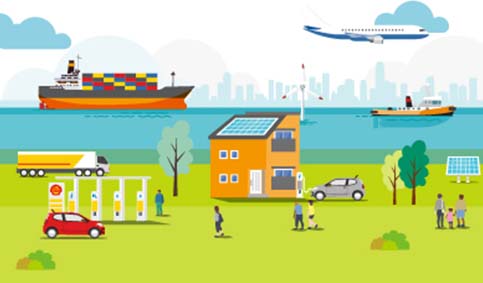Netherlands
Employees
8,176
Total tax contribution
$5,466,213,298
Taxes borne
$351,159,314
Taxes collected
$5,115,053,984
-
Third-party revenues
$37,634,363,808
-
Related-party revenues
$88,731,774,387
-
Total revenues
$126,366,138,195
-
Profit before tax
$846,154,076
-
Corporate income tax paid
$258,949,662
-
Corporate income tax accrued
$290,242,122
-
Stated capital
$204,938,333,254
-
Accumulated earnings
$97,870,252,493
-
Tangible assets
$10,959,269,744
-
Other payments to governments
–
Shell's footprint
Shell has been present in the Netherlands for more than 100 years. Our activities include retail sites, fast-charging for electric vehicles, an energy and chemicals complex, a technology centre and a bioLNG refinery. We are also involved in the development of solar parks, wind farms and geothermal heat.
Shell has a 50% interest in Nederlandse Aardolie Maatschappij B.V. (NAM), which produces oil and gas. In the table, income relating to our share of NAM is included in the profit before tax and accumulated earnings figures.
In 2022, Shell made great strides in supporting the Dutch energy transition. We took the final investment decision to build Holland Hydrogen I in Rotterdam. The 200 megawatt electrolyser is designed to produce up to 80 tonnes of renewable hydrogen per day and is expected to be operational from the mid-2020s. Together with Eneco, Shell won the tender for the construction of a 760 megawatt offshore wind farm at Hollandse Kust (west). We also opened a solar power park with a peak capacity of 30 megawatts.
In May 2022, VNO-NCW, the largest employers' organisation in the Netherlands, published the Tax Governance Code, which Shell helped initiate and develop.
Country financial analysis
The statutory corporate income tax rate in the Netherlands is 25.8%. In 2022, the Netherlands government introduced a "solidarity contribution" as a form of windfall tax in light of the high revenues made by energy companies.
In 2022, Shell reported a profit before tax in the Netherlands of $479 million. The profit before tax figure in the table includes the share of profit from certain joint ventures and associates held by Shell as required for country-by-country reporting. The corporate income tax paid of $259 million and the corporate income tax accrued of $290 million relate mainly to foreign withholding taxes. These are taxes incurred on dividends, interest and service fees received by Shell companies in the Netherlands. These taxes are mainly paid to foreign governments. Shell paid $725 million in corporate income taxes and royalties in the Netherlands, of which $687 million was paid through our 50% participation in NAM.
Read more in Total tax contribution and in Windfall taxes.










